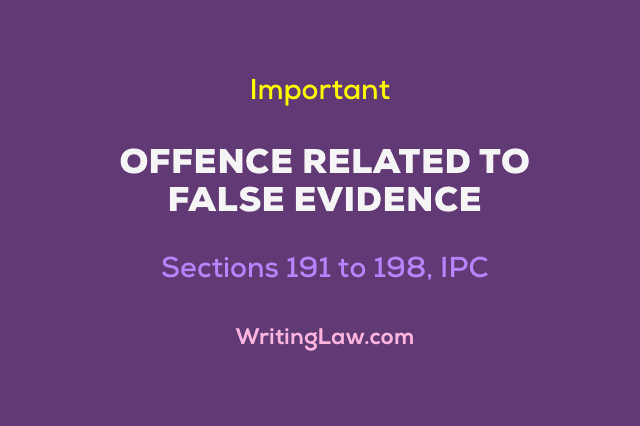
When a person submits or gives any evidence, it is determined to be true. But what if a person gives false evidence or evidence which he believes not to be true? Well, the answer is, he will be punished for providing false evidence.
Firstly, let us understand what evidence is. Any material facts or signs that the court requires to prove something true or verify the truth of any alleged matter can be termed as evidence.
The following article talks about provisions related to false evidence as per Chapter XI of the Indian Penal Code. False evidence as an offence is contained under sections 191 to 198 of IPC. Let us understand these sections in detail.
- False Evidence – Section 191, IPC
- Constructing or framing false evidence – Section 192, IPC
- Use of evidence that is known to be false – Section 196, IPC
- Issuing or signing false certificate – Section 197, IPC
- Using a false certificate as a true certificate – Section 198, IPC
- Punishments Relating to the Offence of False Evidence
False Evidence – Section 191, IPC
Section 191 of the Indian Penal Code talks about the offence of giving false evidence. According to this section, if any person who is legally bound to say the truth, either by an oath or by any express provision of law, gives any statement that is false and which he knows or believes to be false or which he does not believe to be true, is said to give false evidence. The giving of false evidence can be either verbally or otherwise.
Further, where a person instigates another person to make a false statement, he will not be guilty of giving false evidence. However, he will be guilty of abetting that offence.
It must be noted that to make a person liable under this section, he must give false evidence in a proceeding in which the accused was bound by law to tell the truth. Until a person takes an oath, whatever he asserts is considered a piece of information.
If the court has no power to administer an oath, the proceeding will be “Coram non-judice” and cannot be prosecuted for false evidence. In short, where a person is not bound by any express provision of law to state the truth, he cannot be punished for giving false evidence.
Constructing or framing false evidence – Section 192, IPC
Apart from giving false evidence to make another person responsible, people often fabricate false evidence. As per section 192 of the Indian Penal Code, a person is liable for fabricating false evidence if he:
- Causes any situation to exist; or
- Makes any false entry in any book, record or electronic record; or
- Makes any document or e-record comprising of false evidence.
The acts mentioned above must be done with the intention that it may induce a person who is judging the case to develop an erroneous (wrong or incorrect) opinion upon the evidence. Also, such an erroneous opinion must be related to any material fact of the case.
Besides, this section is not only limited to judicial proceedings. It also applies to a proceeding taken by law related to a public servant or an arbitrator. Nonetheless, such proceedings must be legal and authorised by law.
Use of evidence that is known to be false – Section 196, IPC
Section 196 of the Indian Penal Code talks about the offence where a person uses or tries to use any evidence, which he knows to be false or fabricated as true evidence. Such a person is liable under this section and is to be punished in the same manner as if he has given or fabricated false evidence.
Issuing or signing false certificate – Section 197, IPC
According to section 197 of the Indian Penal Code, a person who issues or signs any certificate that is to be used as evidence or is required by the court to be given or signed will be liable to be punished in the same manner as if he has given the false evidence. It is to be noted that such a person must very well know that the certificate is false in any material point.
Using a false certificate as a true certificate – Section 198, IPC
Section 198 of the Indian Penal Code is linked with section 197, IPC (given above). Just like signing or issuing a false certificate, using a false certificate is also an offence. This section makes using a false certificate as true (valid), an offence. Accordingly, any person who uses any certificate knowing it to be false in any material fact as true evidence is to be punished in the same manner as if he has given the false evidence.
Punishments Relating to the Offence of False Evidence
Punishment for giving or fabricating false evidence – Section 193, IPC.
The punishment for giving and fabricating false evidence is given under section 193 of the Indian Penal Code. According to section 193, a person who gives or fabricates false evidence in a judicial proceeding shall be liable for the punishment of imprisonment for a term of not more than seven years. And, also be liable to fine. And, a person who gives or fabricates false evidence in any other case shall be punished with imprisonment of not more than three years and a fine.
Note: Section 193, IPC requires that a person giving or fabricating false evidence must have done it intentionally.
Punishment for giving or fabricating false evidence to make someone liable for capital punishment – Section 194, IPC.
Section 194 of the Indian Penal Code states that any person who gives or fabricates false evidence to make any other person to be convicted for an offence that is punishable with capital punishment is liable to be punished under this section. And, the punishment for such an offence is imprisonment for life or rigorous imprisonment for not more than ten years and a fine.
Further, this section also states the punishment if any innocent person is convicted and executed due to such giving or fabricating of offence. And, the punishment for the same is either death punishment or the punishment as described in the above paragraph.
Punishment for giving or fabricating false evidence to make someone liable for the offence punished with imprisonment for life or imprisonment for a term of more than seven years – Section 195, IPC.
As per section 195 of the Indian Penal Code, such a person who gives or fabricates false evidence to make some other person liable for an offence that is punishable with either imprisonment for life or imprisonment for a term of more than seven years shall be liable in the same manner as a person convicted for such an offence would be liable to be punished.
Punishment for threatening any person to give false evidence – Section 195A, IPC.
Section 195A of the Indian Penal Code states that any person who threatens another person or to anyone with whom that person is connected, either by any injury to a person’s body, reputation, or property is said to commit an offence. However, the sole intention for such an act must be to make that person give false evidence. And, the punishment for the same is either imprisonment for a term not exceeding seven years or a fine or both.
Further, if any innocent person is convicted for death or imprisonment for more than seven years due to such false evidence, the person who has threatened is to be punished with the same punishment in the same manner and to the same extent in which such an innocent person was punished.
Read Next: Classification of Offence as Per CrPC
- Powers of Income Tax Authorities in India - 29th November 2025
- Understanding the Legislative Branch of the Indian Government - 6th May 2024
- Appointment, Oath, and Removal of Constitutional Posts in India - 28th April 2024






